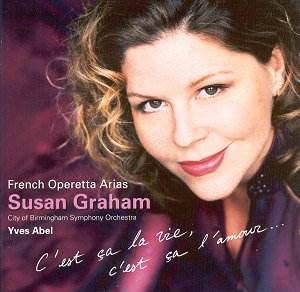What is a mezzo-soprano (6)? [see What
is a mezzosoprano? part (1),
(2),
(3),
(4),
(5),
(6),
(7)]
One of the points we have encountered in this survey
of mezzo-sopranos is that, anxious as they are to find a place in the
sun beside their "big sisters" the sopranos, mezzos are likely
to be much more enterprising over repertoire. We have seen Magdalena
Kozena couple Mozart and Gluck with Kozeluch. We have had Rebecca de
Pont Davies singing mélodies by French women composers
We have had cabaret songs from Malena Ernman and Chaminade from Anne
Sophie von Otter. If Karnéus in Sibelius might seem a more "normal"
choice from a Swedish singer (no complaints, it was a wonderful disc),
here is Susan Graham exploring the later world of French operetta.
For most people, French operetta means Offenbach. We
know, perhaps only by hearsay, that Messager and Hahn wrote a good many,
and yet, as Patrick O’Connor’s helpful notes point out, the genre survived
longer in Paris than in any other city. The disc begins and ends (the
running order is not as above) with extracts from the latest work here,
Toi c’est moi (1934) by the Cuban-born Moïses Simons. This
has a wonderful verve and also suggests that operetta had by this time
reached the "crossover" stage where it was virtually identical
with "light" music. These two pieces are very much in line
with the sort of chansons that were to be immortalised by Edith
Piaf, and might respond well to being sung that way.
However, the rest of the disc does not really bear
this out and those who love the peppery verve of Offenbach may be a
little surprised (not, I hope, disappointed) to find that the predominant
mood is romantic, post-Delibes rather than post-Offenbach. The Hahn
works are from rather late in his career (his first operetta, Ciboulette,
dates from 1923, considerably later than most of the songs he is best
remembered by) while those of Messager stretch from 1897 (Les P’tites
Michu) to 1928 (Coup de roulis), showing remarkable consistency
over a 31-year stretch. One piece stands out from the rest: that from
Honegger’s Les Aventures du roi Pausole (1930). Honegger, as
we know, was a thoroughly serious composer and, more than actual operetta,
this sounds like a serious composer’s rather acid stylisation of operetta,
with a bit of cabaret thrown in. Operetta-lovers may not even like it,
but I did, and also thought it one of the pieces which suits Graham
best.
For I now have to say that, though Susan Graham is
unquestionably a fine singer, I feel she is perhaps not quite ideal
for this music. She is a "high" mezzo, like von Otter, rather
than a "low" one like Karnéus (her low Cs in Amour,
amour are rather weak for a mezzo). In pianos, her voice has a creamier
quality than von Otter’s, a quality which, as she rises to mezzo forte
and beyond, becomes, not hard but a little "matronly". There
is also a "beat" on the long medium-high notes which seems
more suited to full-scale opera. Her final note in the Brummell
piece has an almost tragic air that would be fine in Gluck. In other
words, I find the actual timbre a little heavy for the music. In the
Simons pieces I missed the devil-may-care verve of von Otter’s Chaminade
and the Hahn lack something in evanescence. The more serious Messager
– the most "operatic" pieces here – suit her best; Mon
rêve, in particular, gets a most beautiful performance and
so, as I said above, does the Honegger. But it’s all good singing, there’s
no doubting that, and those interested in the repertoire should not
be deterred by my slight doubts. She trios very effectively with herself
in O mon bel inconnu.
I praised highly Yves Abel’s conducting of Madam
Butterfly in Chandos’s ‘Opera in English’ series and the favourable
impression is confirmed here. Hahn’s orchestra, incidentally, frequently
has a prominent part for the piano, to rather fascinating effect. The
recording is excellent, the notes, as I said above, are by a well-known
expert in the field and we get original texts with an English translation.
But – and I’ve niggled about this on other occasion – they are printed
in white on a dark mauve background. Steer clear of artificial light
and have a magnifying glass at the ready, and you should be all right.
Christopher Howell
[see What
is a mezzosoprano? part (1),
(2),
(3),
(4),
(5),
(6),
(7)]


